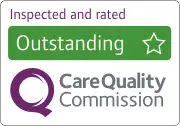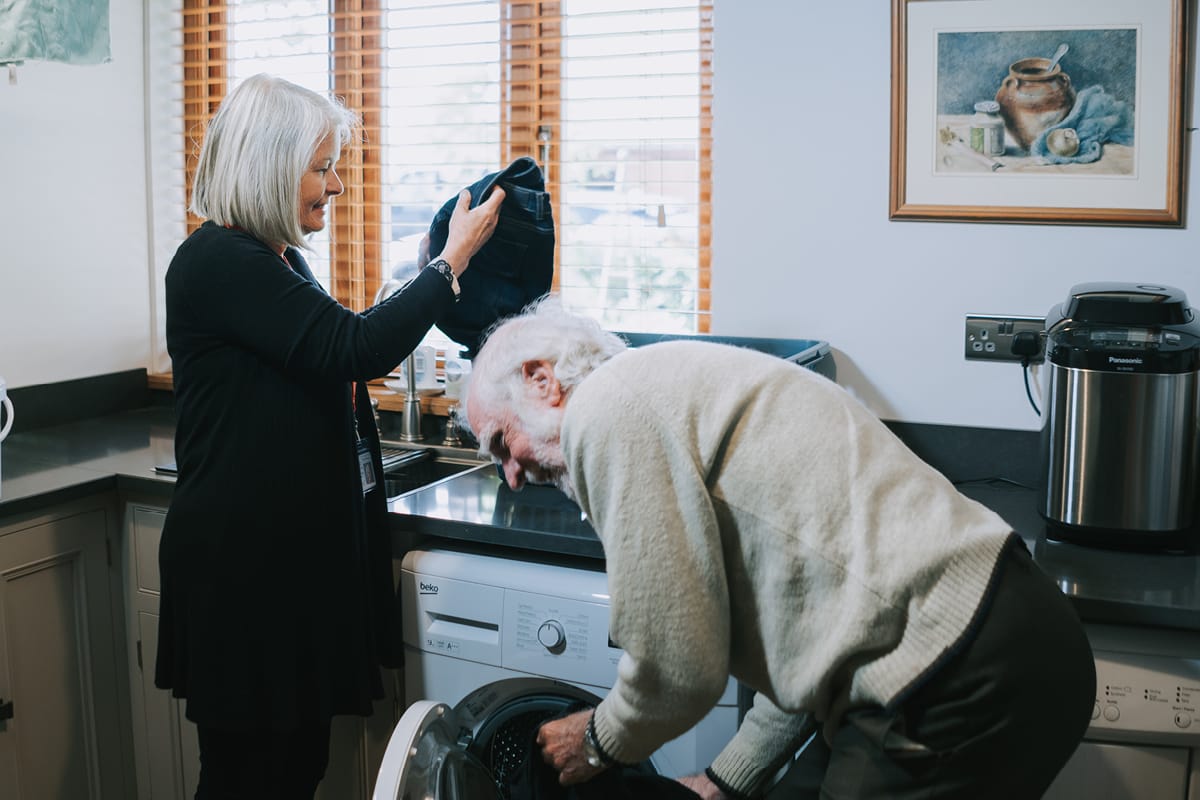Live In Care Costs: To UK Carer Prices & Services
Speak to a care expert
- Personalised round-the-clock support - 24/7 expert care from a Caregiver who knows everything from your medication routine to how you like your cup of tea.
- A team that knows your area - Experienced Caregivers supporting families from Wolverhampton to Warwick and everywhere in between.
- Stay independent in familiar surroundings - Helping individuals remain at home, close to loved ones, local parks, and the high streets they know.








My mum’s got all her things around her, she’s got more freedom and 1-1 with the carers. She sleeps better, eats better, is more content and can go out when she likes.
Instant care cost calculator
Our friendly care cost calculator gives you a quick estimate based on your unique needs
Rated 9.9/10 on homecare.co.uk


One of the Top 20 Home Care Groups in 2024 - homecare.co.uk


Most of us share a common wish - to age with grace, dignity and independence, surrounded by the familiar comforts of home. For older adults needing additional care and support, live-in care enables just that. But just how much does live in care cost and what can you expect in return?
With the cost of live in home care ranging anywhere between £900 to £1800 per week, here we will explain the costs involved and contrast 24-hour home care with alternatives like care homes and nursing care.
Understanding live in care costs
Clear, straightforward pricing with no hidden fees—so you’ll always know what to expect.
Care for couples
An expert Caregiver provides personalised, round-the-clock care for both partners, ensuring they can continue to live comfortably together at home.
£2,240 /per week
No setup fees
Free assessment
Care for individuals
Attentive one-to-one support from a fully-trained Caregiver ensures all your needs are met and you can remain safe and comfortable at home.
£1,785 /per week
No setup fees
Free assessment
What our pricing includes
- Tailored care plans to meet individual needs
- Emotional support and companionship
- Help with daily activities: personal care, meal prep, light housework, and medication management
- Specialist care for complex conditions like dementia and Parkinson’s
- Regular check-ins and updates with family members
- 24/7 support from a dedicated Care Manager
- No minimum term or lengthy contracts
FREE Live In Care Guide




What Is Live-In Care?
First, let's quickly touch on what Live-in care is; a personalised home care service where a professional carer resides in your home. They provide one-to-one assistance and support tailored to your specific needs. This form of care is a practical alternative to moving into residential care, especially if you would prefer to stay in your own home and maintain the continuity of your day-to-day routines and surroundings.
Having ongoing care in your own home not only allows for greater assistance with your practical needs, it also provides a uniquely personal level of companionship, connection and emotional support.
The live-in carer helps with personal care, medication management, housekeeping and other daily activities, seamlessly adapting to your preferences and routines. For more in-depth information be sure to check our Guide To Live In Care.
How 24-Hour live in care works
Matching
We carefully identify the right carer for you.
Availability
You benefit from around the clock support.
People
Your family and friends visit as before.
Bedroom
You provide a bedroom for the carer to rest and sleep.
Home
You remain in the comfort of your own home.
Flexible
As much or little care as you require.
Friends
Our carer becomes more like a friend.
Personalised care in just
Simple steps to get the right care in place quickly
1. You’ve found the right care
You’re on the right path to personalised live in care.
You're here
2. Free assessment
Call or enquire online. We’ll start with a chat and arrange a free home visit within days to ensure you get the right care.
3. Crafting your care plan
We’ll create a care plan tailored to your loved one’s needs and lifestyle.
4. Matching your Caregiver
Together we'll find a Caregiver who's a perfect match for your loved one’s needs and personality.
5. Care in place
Care usually starts within a week. Your Care Manager will attend on day one and check in again on day seven.
How Much Does Live-In Home Care Cost in the UK?
Live-in care is an increasingly popular option for those who require more permanent care and long term support.
The cost of 24 hour domiciliary care can vary in the UK depending on the type of care required, whether the care provided is a fully managed service, the individual’s health condition and needs, and geographical location.
Depending on these criteria you will find average weekly rates for live in care may range from £900 to £1800. However, it's essential to consider your specific needs when estimating the cost of 24-hour care.
For instance, individuals with complex care requirements may find care costs will rise due to the specialised skills and training required of the care worker.
There are several factors to consider when weighing up the cost of a live-in carer, including the following:
Location: The cost of live in care can vary from region to region. For example, across the UK, prices range between £900 to £1800 per week, with some providers adding an increase for London or remote/inaccessible locations.
One Person Care vs a Couple: The costs discussed so far are based on a live in carer supporting one person. For couples where one caregiver can support both, the cost of care increases to between £1700 and £2300 per week.
Level of Care: The cost of live in care can also vary depending on the level of support required and could increase by up to £200 a week for more specialised care or even further if more than one Caregiver is required. In some circumstances, it may be possible to have a full-time live in carer supported by a visiting carer for the times when two people are required.
It's worth noting that local authorities may fund care if your assets are below a certain threshold. In England, this threshold is set at £23,250, but it's higher in other parts of the country. With all these factors to consider, it's important to understand how your specific circumstances may influence the cost of care at home.
Understanding the Variance in Live-In Care Costs
When it comes to finding and enlisting a care provider, there are different options available, each affecting the cost you pay. Understanding how these options work is crucial to weigh up which one is right for you.
Fully Managed Service (Regulated by the Care Quality Commission)
Fully managed services, like Unique Senior Care, are regulated by the Care Quality Commission (CQC), ensuring adherence to rigorous quality standards. These providers handle all aspects of care, from carer recruitment and training to management and care delivery.
Clients benefit from comprehensive support, complete accountability, and peace of mind. All of our carers are our direct employees , we never use agency staff to supplement our team.
Opting for a fully managed service means entrusting your loved one's care to a provider adhering to stringent quality controls and accountability measures. With regulated care providers, clients can expect personalised, high-quality care delivered by trained professionals, backed by independent regulatory oversight.


Introductory Agency (Non-Regulated)
Introductory agencies connect clients with self-employed carers but do not directly manage the care provided. While these agencies offer cost savings, clients assume responsibilities such as carer management and supervision. Quality and oversight may vary, as these agencies are not subject to regulatory standards like regulated providers.
Choosing an introductory agency offers flexibility and cost savings, but it comes with added responsibilities and potential variability in care quality. Families must weigh the benefits of lower costs against the risks of limited oversight and accountability.
When choosing a live-in care provider, it's crucial to consider both the cost and the level of support they offer. Whether you opt for a fully managed service from a regulated provider or prefer the flexibility of a non-regulated agency, the main goal is to ensure the best care for your or your loved one. Understanding the differences between providers helps you make a decision that prioritises well-being and dignity.
What makes us different?
Our standards are uncompromising, and we are very proud of our reputation for providing an outstanding service.
100% of our Carers are directly employed.
We only employ the best people – who have to pass our ‘Mum test’ ie would we allow them to look after our own loved ones?
Our staff do not wear uniforms – so they just look like a family member or friend when out and about with our clients.
Our Live-in care service enables our clients to remain living where they want, such as in the comfort of their own home.
In case of emergencies, we operate an out-of-hours on-call service
Clients and their families have rated us as one of the Top 20 homecare providers in England in 2024 (and previously in 2021, 2022 and 2023).
Your 100% satisfaction is our aim – if you think we need to do better, please let us know.




I really happy with the live in, she is true credit to your team.
Tom, Shipston on Stour
Is Cost Effective Compared to a Care Home?
When comparing the cost of a live-in care service to residential care, several factors come into play. While live-in care at home offers a personalised, one-to-one service in familiar surroundings, care homes may offer a less tailored range of care but with the advantage of being in a communal setting.
Here are some factors to consider when comparing the cost of 24 hour live in care versus the cost of a care home.
Costs of Live-In Care vs. Care Home:
Similar to live-in care, care home fees also depend on the level and type of care needed, as well as the location of the care home. Residential care home costs in the UK are around £928 per week, while in London this is likely to be be more expensive.
However, the average nursing home cost ( where needs are greater and therefore require a nursing level of care) is around £960 per week across the United Kingdom. This figure will also likely be higher in London.
If you are looking to receive Local Authority Support for your care you may find that their assessment takes into account the value of your property if moving to a care home setting. However if you choose to stay in your own home the value of your home can not be included in their means testing process.
The following resource (button below) offers detailed insights into how live-in care provides a personalised, secure, and cost-effective alternative to residential care, exemplified by real-life testimonials and an in-depth comparison of benefits.
Benefits of Live-In Care vs. Residential Care Home:
Personalised care: 24 hour care offers personalised support, tailored to your specific needs and preferences. This can be particularly beneficial for individuals with complex care requirements.
Familiar surroundings: Allows you to remain in your own home, surrounded by familiar settings and cherished memories. When a loved one moves into a care home, it can have an emotional and psychological impact on the whole family.
Couples care: Can be significantly cheaper than a care home when evaluating the cost of two placements, resulting in significant savings for couples who can be supported by one carer at home.
Independence: Allows you to maintain independence and control over your daily routines, which can be important for your overall wellbeing.
Flexibility: Can be more flexible than care home arrangements, as it can be tailored to your individual requirements.


What Services Are Included in the Cost of a Live-In Care Package?
A comprehensive live-in care package typically includes support with personal care, meal preparation, medication management, mobility assistance, and companionship. Specialised care services, such as dementia care or respite care can also be included in your care plan, which is fully tailored to meet your unique requirements.
Live-in carers are trained professionals, who can seamlessly adapt to your specific routines and lifestyle. Aside from providing physical help, the also offer emotional and social support to ensure you live a dignified, quality life in the safety and comfort of your own home.
How do I Pay for a Live-In
In the UK, several options are available for funding the care you need. The following are some of the routes you can explore to pay for care:
Private pay:
Opting for self-funding is a common approach when choosing a private care provider. This is where the cost is covered by you or your family. This is usually invoiced on a monthly basis by your care provider, or if using a care agency not regulated by the Care Quality Commission (CQC), maybe weekly.
Long-term care insurance:
Long-term care insurance is a type of insurance policy that covers the cost of long-term care, including care at home. The cost of the policy will depend on your age, health condition, and the level of cover required. Please make sure that you seek IFA guidance if considering any kind of care annuity.


Social care support:
Health and social care support, subject to eligibility criteria, can contribute towards a person's care expenses. The local authority must carry out a financial assessment if it chooses to charge you for the cost of the services you need to live well. The purpose of the financial assessment is to work out how much, if any, you need to contribute towards the cost of your care.
NHS continuing healthcare is a package of care you may be entitled to if you have a serious disability or illness. It covers the full amount of your care, whether in your own home or a care home, including healthcare, personal care (such as assistance with washing and dressing), and care facility fees such as accommodation costs. You may qualify for NHS continuing healthcare if you have a "primary health need." This means that the majority of your care must involve managing your health needs, rather than social or personal care needs.
The local council may help pay for your care if you meet certain eligibility criteria. The first step is for them to carry out an assessment to determine how much help you need. This is called a needs assessment. This is free and anyone can ask for one. If you're eligible for council-funded care, you'll also have a financial assessment to work out how much you need to contribute towards the cost of your care. Depending on the outcome, the council may cover a portion of the cost and you pay the remainder, or you may be responsible for the entire cost of your care.


A Final Word on Live-In Care Costs - Choosing What's Closest to Your Heart
Choosing live-in care for yourself or a loved one means embracing the comfort and familiarity of home during the later years. We completely understand that weighing up the costs involved is an important and critical part of the decision-making process.
Hopefully, we have explained that there are options like insurance, shared family contributions and social services that can make quality live-in care accessible.
This is a personal decision guided by what you and your loved ones value most and the care you need. Having open conversations with each other and with trusted care advisors can provide clarity. If home means more than just physical space, but instead cherished memories and time together, then live-in care may be the right fit.
Focus on what upholds your dignity, happiness and independence. With compassionate support from a live-in carer, you can gracefully continue to live life's journey in the comfort of your home. Laughter with family over tea, walls holding a lifetime of stories, the joy of familiar routines - with live-in care, home is where the heart is.
If this resonates with you, please reach out so we can explore your care options. We're here to listen and help you make the decision that's right for you and your family.
Where Do You Provide Live-In Home Care Within UK?
Our live-in care services extend from the Lancashire and West and South Yorkshire in the North to East Anglia, Essex, down through the South East, across the central belt, home counties, and south coast, reaching as far as Devon, Dorset and Somerset.
We are dedicated to maintaining our “Outstanding” CQC Rating and constantly expanding our service areas. Please contact us to confirm if we provide care in your area, as our coverage is always growing.
How Do You Differ From A Care Agency?
We differ from typical care agencies as all our Caregivers are directly employed by us. We ensure the highest quality of care through our in-house training academy, consistent with our commitment to excellence.
How Do I Arrange Live-In Care?
To arrange a live-in care package for you or your loved one starts with an initial discussion with one of our specialist care advisors. From there, they will arrange for one of our Registered Care Managers to visit you at home, without cost or obligation to further discuss and assess your live-in care at home requirements.
Should you then wish to choose us as your live-in care provider our team will then select the most suitable Caregiver for your needs and agree with you when to put care in place.


Speak to our live in care experts
Meet Stacey, your friendly expert care advisor
Navigating Live in care can feel overwhelming, and we understand how personal this decision is. We're here to guide you every step of the way—offering advice, reassurance, and ensuring your loved one receives the highest quality care.
- Quick 30-minute call: We'll discuss your situation and provide expert advice on care options.
- Book a free assessment: If you're ready, we can arrange a no-obligation assessment to match your needs.
- Fast, flexible care setup: We can start care within days if necessary, ensuring your loved one receives prompt, personalised support.
Inspected and rated
Outstanding by the CQC


FREE assessment enquiry
Stacey or one of our team of friendly and experienced care advisors, will be in touch as soon as possible by phone or email to discuss your live in care needs.